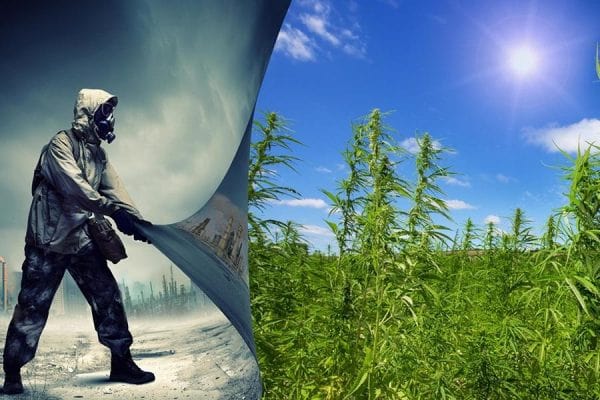The industrial, medicinal and commercial properties of hemp have been known to mankind for a very long time, but its benefits to the environment have just been realized in recent years. Many industries looking for sustainable and eco-friendly processes are turning to hemp for the answer. Its cultivation does not need any particular climate or soil and is thus found in all parts of the world.
In a time when we are not-so-gradually moving towards the destruction of our planet, the need for sustainable alternatives has increased. While the world is busy thinking of possible alternative solutions, Mother Nature has already provided us with one. All that is left to us is to make the most of it.
Have you thought about using more hemp-based products? Want to learn more about why it’s crucial we reduce the stigma surrounding hemp?
If so, keep reading — and learn how hemp plants can help you do your part to save the world.
Paper
Paper can be manufactured from hemp. Since hemp has a low lignin content compared to wood, it can be turned to pulp faster and easier; this naturally bright pulp does not need chlorine bleaching, which is used in traditional paper mills and releases a toxic substance called dioxin into the environment. Hemp is also compatible with the new soy-based binders rather than the harsh binders that give off formaldehyde.

This reduces air pollution and health hazards to human and animal life. The quality of paper obtained from hemp is more durable and does not lose its color even after many years. Much more can be got out of each hemp plant since its paper can be recycled 7 or 8 times, as compared to only 3 for tree-based paper.
IT SAVES OUR TREES
Deforestation is a worldwide environmental problem that’s destroying ecosystems and causing species to go extinct.

Luckily, each hemp plant saves the lives of about 12 trees. Plus, hemp-based products reduce the amount of pollution created by the average manufacturing process. It replaces trees as the source of raw material for wood and paper, thereby conserving forests. Trees take years to grow, while a crop of hemp can be grown in a few months. Only one acre of hemp can produce as much paper annually as 4 acres of trees.
IT HELPS TO ELIMINATE TOXINS
Toxins aren’t just bad for the health of humans — they’re also incredibly detrimental to their environment.
Especially within the textile industry, many fabrics are loaded with dangerous chemicals to help them last longer and to prevent tearing.
Hemp is strong enough on its own. This means there’s no need to add any harmful toxins to hemp-based fabrics.
So, to reduce the environmental impact of your closet, look out for hemp-based clothing lines!
CARBON SEQUESTRATION
Probably not a term that you are familiar with. Carbon sequestration, in general, is the process through which carbon dioxide is captured from the atmosphere and stored to prevent it from being emitted back into the air.
It’s a great method of reducing the amount of carbon dioxide that it’s the air and as a consequence, preventing climate change and global warming. The usual method is using specific plants, which are known as biomass plants, that will draw carbon from the atmosphere and then these plants can be slowly smoldered to create something known as biochar.
This is a form of charcoal that can then be mixed back into the soil. In the case of hemp, it’s one of the highest yielding biomass crops on the planet and because it’s so easy to grow and maintain, it’s the perfect crop to use for Carbon bio-sequestration.
By growing hemp and putting Carbon bio-sequestration into action, we would be starting a cycle of removing the carbon dioxide content in the air and resupplying it to the earth. Once again taking steps to prevent the effects of climate change.
While hemp won’t solve all of our environmental problems, there is certainly a variety of different ways in which it can be used to fight against climate change. With this being a very immediate problem, it might be time to start making use of hemp in more active ways.
IT’S PESTICIDE-RESISTANT
If you’ve spent even a couple of minutes online researching the potential effects of chemical pesticides on our food sources and health, you know it can get scary pretty quickly.
Fortunately, the chemical makeup of hemp is pesticide-resistant on its own. If you’re a farmer or even a casual grower, anything you can do to reduce your use of these deadly pesticides could potentially save lives — not to mention benefit the environment.
IT’S USED TO MAKE BIODEGRADABLE PLASTICS
Plastic waste is killing more animals than ever before. Even if you take care to properly recycle your plastics, you can’t control what happens after they’re carted away.
Sadly, the majority of plastics aren’t bio-degradable.
However, hemp-based plastics are 100% biodegradable. Isn’t it time you made the switch?
We are all aware of the way plastic is destroying the earth. The need for an alternative solution to plastic is supercilious to all other needs. Hemp helps us here too. Hemp provides an option to create a non-toxic and completely bio-degradable plastic that can be used in the stead of regular plastic.
HEMP PLANTS PROVIDE ENERGY & FUEL

If you’ve ever tried to grow your own hemp, you know that the plant doesn’t require much care.
In addition to being relatively low-maintenance, hemp is also an incredible source of energy.
Hemp plants create a high amount of cellulose at a rapid rate, which aids in the creation of environmentally-friendly things like biofuel. The woody hemp plant is low in moisture; it dries quickly and is an efficient biomass source of methanol. The waste products produced by using hemp oil are a good source of ethanol. Both methanol and ethanol are produced from hemp through the efficient and economical process of thermo-chemical conversion. One acre of hemp yields 1,000 gallons or 3,785 liters of fuel. Hemp allows a lesser reliance on fossil fuels, which are non-renewable sources of energy and will not be able to meet the increasing global demands for long.
A SUSTAINABLE TEXTILE

Fabrics made from hemp growing are more sustainable than many alternatives. This is because they are resistant to mold, mildew and UV light. Plus, unlike other textiles, you don’t need to use any chemicals on hemp fabrics.
The durability quality of hemp has seen it used as a fabric for a whole host of purposes. In the past, hemp has been used to make ropes and sails for boats.
For the same reason, it was a great material for ropes and sails, it’s great for making sustainable clothing. You can mix hemp fabrics with other fabrics to enhance the durability of the clothing.
This makes it a key player in the future of sustainable fashion.
CONSTRUCTION
The concrete and cement construction industry is also a significant source of air pollution and climate change. Therefore, the industry is eager to find alternative sources of materials so they can keep building our cities.
Hemp could be part of the solution to this problem.
By mixing hemp hurds with a solution of water and limestone, a concrete-like substance is created which is known as Hempcrete. After some time, the material solidifies. This makes it resistant to damage from earthquakes and extreme weather.
The material can also absorb the heat from the sun. This means that buildings constructed with this hemp mixture are comfortable for the occupants regardless of the weather outside.
The uses of hemp also extend into construction. Fiberboards made from a hemp-based composite are stronger yet lighter than those made from wood. The combination of hemp fiber and lime results in a sound-proofing and insulating material that is stronger and lighter than concrete. By replacing wood and concrete, the amount of waste matter at a construction site is reduced. Since homes built using hemp products have better thermal insulation, less fuel will be consumed for heating their interiors. Bio-based plastics can be made from the long hemp fibers, and these are almost as strong as fiberglass. Hemp is an economical construction material that is recyclable, cheaper than glass and safe for the workers.
EATING HEMP FOR NUTRITION

The process of meat production is one of the most significant contributors to global climate change and greenhouse gas emissions. Because of this, many scientists have urged people to reduce meat consumption. As a result, many protein alternatives, such as quinoa and soya, have become popular among consumers.
However, hemp is also a protein alternative. But unlike other alternatives, hemp growing does not cause soil erosion, a significant problem in agriculture.
Many farmers also use synthetic fertilizers, pesticides, and herbicides to produce many types of crops. But hemp growing doesn’t require any of these measures, which means it has a lighter touch on the planet.
For hemp plant produces up to 7000 seeds. Hemp grows almost 800 pounds of seeds for every acre. This means that hemp growing has a higher yield than many other crops.
Only a quarter of the hemp seed is made up of proteins. The two proteins in hemp are called albumin and edestin. However, in contrast to the proteins in soy, the proteins in hemp are easy to digest for humans.
Hemp can be an important part of a healthy, nutritional diet. It includes many vitamins as well as:
- Omega 3, 6, 9
- GLA
- All 9 of the amino acids
- Antioxidants
- Fibre
- Iron
- Zinc
In contrast to other protein sources, hemp doesn’t contain “oligosaccharides”. This is a carbohydrate that causes gas and stomach aches.
ECONOMICAL BENEFITS
Legalizing Hemp will create new jobs, new opportunities for business and tax revenues for government and help farmers. It will help the farmers to grow a new plant which helps them make their demands fulfilled and also help the economy of India to reach a new level.
It has been suggested that the cannabis/hemp industry would add $40 billion to the US economy by 2021 and would provide 4, 14,000 jobs. The industry in Canada is expected to grow to $6.5 billion by 2020, while in Europe it is expected to worth £106 billion by 2028.
So it can be well understood that by legalizing Cannabis/Hemp/Marijuana it will definitely help in the economic boom.
Watching the growth of the Hemp industry closely, we believe that it is on the verge of worldwide growth. India is actually sitting on a pot of gold because as a country we have immense knowledge about its use and favorable climatic conditions for its production. Legalizing hemp would mean that we can be a key player in this growth and carve a place for ourselves as a leader of Hemp-based products.
It is time we considered legalizing the herb. And why wait for a better day, when we can do it now!






